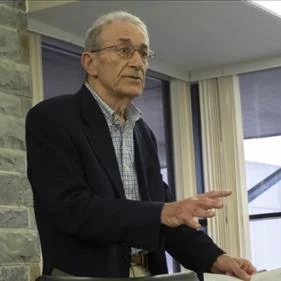A modern exodus

Photo by Julia Cherruault.
Claude Cohen, an Egyptian-Karaite Jew, and his family knew it was time to leave the only home they’d ever known.
They saw members of their extended family arrested and placed in Egyptian detention camps in the 1960s, a time when anti-Semitism was rampant. Along with his mother and sister, Cohen fled to Paris in his early 20s in 1966.
More than 30 Jewish and non-Jewish students as well as local community members gathered at Ithaca College Hillel on Sept. 24 to hear Cohen’s story and learn about Karaite Jewry, a sect of Judaism that originated in Egypt during the ninth century.
The program, titled “A Modern Exodus,” was hosted in partnership with the Student Leadership Institute of Ithaca College.
Cohen, a professor emeritus of engineering at Cornell University, recalled that even before he and his family left Egypt, the Karaite population had rapidly declined in the Middle East due to various wars, religious prejudice and emigration.
“The Jewish population in Egypt grew to about seventy to seventy-five thousand,” Cohen said. “It started to decrease rapidly, particularly after the war of 1956 during the Sinai campaign, where Egypt was invaded by Israel, France and England.”
The event was the first installment of “Global Faces of Judaism,” an ongoing series at Ithaca College Hillel that showcases diverse Jewish communities across the globe. Launched by Springboard Innovation Fellow Austin Reid, the new program teaches students about the Jewish people and how they encompass a broad range of sects, cultures and traditions.
When first surveying the Jewish community at Ithaca College, Reid found students were interested in learning more about the diverse background of the global Jewish community.
“Some members of Hillel at IC have expressed a desire for programming which lifts up the experiences of Jewish communities from various parts of the globe,” Reid said. “The Global Faces of Judaism series is one of the means by which Hillel at IC is meeting the interests of our membership.”
Cohen, who studied at American University in Cairo, also explained how some Karaite traditions differ from the practices of other Jewish communities, such as not lighting Shabbat candles and taking off shoes before prayer.
“Karaites do not always take the Torah literally and sometimes take it more generally,” Cohen said.
He pointed out that Karaite Jews interpret mitzvot more figuratively. Instead of using tefillin, they understand the V’ahavta prayer requires extra focus and concentration when reciting the Shema.
Most notably, Cohen explained that Karaite Jews regard the Tanakh alone as the supreme law of theology. It’s distinct from mainstream Rabbinic Judaism, which accepts the Talmud as an authoritative interpretation of the Torah.
Unagh Frank, a student who attended the event, said she appreciated Cohen’s story and the example of leadership that Cohen showed as a person. He demonstrated his dedication to Karaite Judaism, Frank said.
“Sharing your history and journey is a really cool way to connect with other people,” Frank said. “Part of being a leader is continuing to grow with yourself and the people who you are leading. I think it could be interesting for the people who are here to see how one person’s journey can contribute to our learning.”
Local community member Lise Rosenfield said: “It is good for students to be exposed to the history and the broad range of Judaism in the world. People need to hear about our history.”
The next guest speaker in the series will visit Ithaca College Hillel on Oct. 22 to speak about the Abayudaya Jewish community in Uganda.
— Jordan Stecker